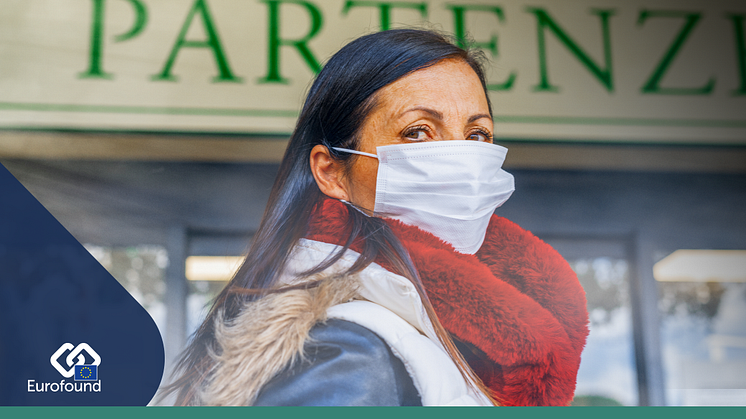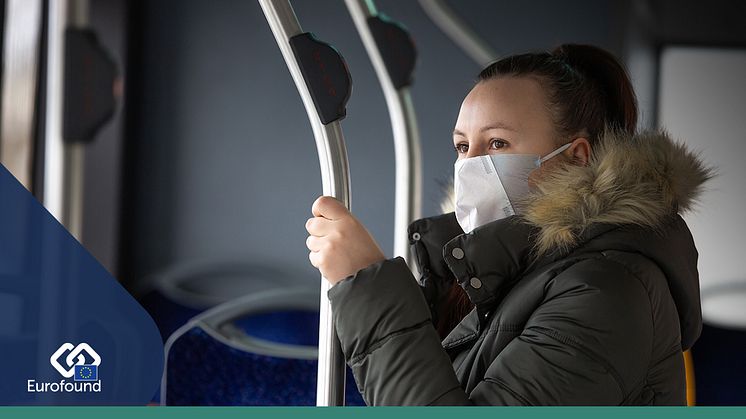
News -
Easing of restrictions sparked boost in mental well-being across Europe with largest increases for older people; but young people, unemployed cause for concern
Mental well-being among people in Europe improved between the April and July waves of Eurofound’s Living, working and COVID-19 surveys, with the largest increases among those aged 50 and over. On a national level, reported mental well-being was highest in Denmark, Slovenia and the Netherlands, and marked improvements were seen in France and Italy – coinciding with an easing of confinement measures over the summer. Despite broad improvements in a number of well-being and quality of life indicators over the summer months, comparatively low reported mental well-being was recorded among younger people and the unemployed; this is cause for concern, particularly considering that mental well-being has traditionally been higher among younger age groups.
Eurofound’s unique Living, working and COVID-19 research looks in detail at the experiences of citizens in both April, when much of Europe was under heavy restriction, and July, when restrictions had been eased according with a relative retreat of the coronavirus. The full report details the social, economic, labour market, and quality of life findings of a total of 87,477 respondents across the EU. Notable improvements can be seen related to mental well-being, life satisfaction and optimism between the two surveys, although from a very low base in some Member States.
The WHO-5 mental well-being index was used in the surveys as an indicator of people’s moods over the previous two weeks, based on five statements of positive feelings, with mental well-being measured on a scale of 0 to 100. Respondents in Denmark (61), Slovenia (58), the Netherlands (57) and Finland (56) indicated the highest mental well-being in July. Respondents in Romania (48) and Cyprus (48) had the lowest mental well-being. Overall, mental well-being in the EU increased from 49 in April to 53 in July, with the largest increases observed in Bulgaria (7 points), France (6 points) and Italy (6 points). When an analysis according to population groups is applied, respondents unable to work due to health reasons and unemployed respondents had the lowest mental well-being in July, though both groups experienced an improvement since April. Retired respondents had the highest results.
Improvements were also seen with regards to loneliness, something that could be expected from the easing of restrictions. The proportion of respondents overall who felt lonely ‘all’ or ‘most of the time’ dropped from 16% in April to 13% in July. Gender differences in terms of loneliness were small, but there were large differences across age groups, with young respondents still reporting loneliness most frequently (16% in July, down from 20% in April), followed by the middle age group (14%, down from 15%) and those aged 50 and over (11%, down from 15%).
Improved findings in mental well-being and loneliness were reflected in levels of optimism and life satisfaction. In the first round of the survey, 45% of respondents expressed optimism about the future; this was 49% in the second round. Despite expressing lower mental well-being, respondents under 35 were significantly more optimistic than older groups, with 57% of this group feeling optimistic in July, in contrast to just 48% of 35- to 49-year-olds and 46% of those aged 50 or over. Statistically significant improvements in life satisfaction were also recorded among respondents in 16 Member States, mostly notably in France, Greece and Italy.
Speaking about the findings, Massimiliano Mascherini, Eurofound Head of Unit for Social Policies, said ‘Improvements in mental well-being, life satisfaction and optimism for the future across Europe between April and July are heartening – particularly for southern and eastern Europe where indicators were particularly low. These improvements occurred alongside the relative easing of COVID-19 restrictions. This research will be important for Europe’s broader economic and social responses to this pandemic, particularly from a longer- term perspective.’
Read more:
- Full report: Living, working and COVID-19
- Explore the data: Quality of life and quality of society during COVID-19
- WHO: World Mental Health Day 2020




